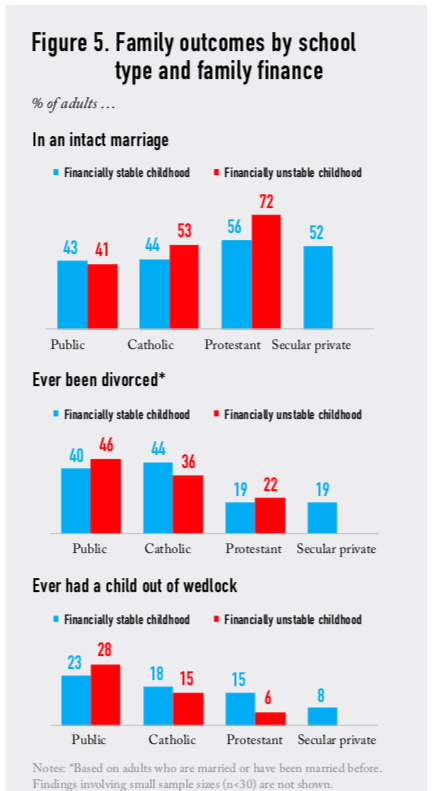I did not always fit in at the Christian schools I attended growing up. I was one of only a handful of students who did not have both parents at home, which meant I was the only one in my class with a different last name than the rest of my family because my divorced mom had remarried. This required complicated explanations to my classmates and sometimes even teachers; most of them lived in a world where most moms and dads were married, so their children shared their last names. It meant I had to ask permission from the front office to wait with my little brother after school, long after everyone else had gone home, until our single mom could get off work to pick us up. And it meant that I did not have my father there to walk with me in homecoming court senior year. Often, neither of my parents were present during special school ceremonies because my father lived in another town, and my mother could not always leave work.
As a shy child, I didn’t like feeling different from my classmates. I secretly resented them for their seemingly perfect family lives and wondered what it would be like to see both my parents’ smiling faces in the audience during a school play or to be able to share a last name with my mom and half-siblings. But I knew enough to be grateful for the sacrifices my mother was making to keep me in private school — even if I didn’t always feel like I belonged there.
When I grew up, got married, and had kids of my own, I knew I wanted a Christian education for my own kids. I eventually convinced my reluctant husband that our two-income family could afford the private school tuition if we budgeted carefully. To make it work, we’ve had to sacrifice things like a bigger house in a fancy neighborhood and newer cars, but we have never once regretted these sacrifices.
An investment in my future
Christian education began influencing my life from about the age of two, when my newly divorced mother enrolled me in one of the area’s most popular Christian preschool programs. It was an expensive choice for a single mother, and one she continuously had to defend to family members who questioned why she would pay private school tuition when she could barely make ends meet.
Because we moved around a lot, I ended up attending five different Christian schools over the years, ranging from a tiny Pentecostal-run academy to the large Southern Baptist school from which I eventually graduated. Nonetheless, Christian schooling became one of the few constants in my life when the shape of my family never stayed the same. Even after another divorce, various job changes, and relationship challenges, my mom always found a way to keep me (and for a time, my younger siblings) in Christian school.
It turned out to be one of the best investments she would make in my future. For me, Christian schooling served as a lifeline out of a world plagued by father hunger, family disfunction, and economic instability. Not only did I receive a private school education, but I also gained the direction and support I needed to stay on a path toward the stable family life I enjoy today.
A report about private education
My experience with Christian education is backed up by a report from the Institute for Family Studies and the American Enterprise Institute. The Protestant Family Ethic, written by Albert Cheng, Patrick Wolf, Wendy Wang, and W. Bradford Wilcox, is the first of its kind to analyze the effects of private versus public schooling on three family outcomes for adults. The report found that students educated in private schools, especially Protestant schools, are more likely to be in intact marriages and to avoid out-of-wedlock births as adults.
One of the report’s most striking findings involves the powerful effects of religious schooling on students from lower-income backgrounds. As the authors explain, “religious schools, both Catholic and Protestant, have comparatively more positive influences on family stability for students who grew up in financially difficult circumstances.”

According to the report:
“About 40% of public-school attendees who grew up in financially unstable households eventually marry and never divorce. The rate is higher for Catholic-school attendees who grew up in the same unstable financial situation (53%). Meanwhile, Protestant-school attendees who grew up in financial hardship are the most likely to marry and never divorce; 72% are still in their first marriage.”
In addition to the differences between religious and public school students, the figure above also reveals that students from financially unstable backgrounds reap more positive family outcomes from religious schooling than students from financially stable backgrounds. Among Protestant school students in particular, those who grew up in financially difficult circumstances are significantly less likely to have a nonmarital birth and to have divorced than those from financially stable backgrounds.
3 ways religious schooling shaped me
As someone who was raised in a financially turbulent, single-parent household, I have a few theories about why this might be the case. Religious schooling shaped my future family life for the better by providing me with three things I needed the most:
1. Examples of healthy marriages and decent fathers and husbands.
Growing up in a broken home where men were either absent, unreliable, or dangerous, the messages I absorbed about fathers, marriage, and family life were overwhelmingly negative. But in Christian school, I found peace and hope in the midst of family turmoil. It was there that I was introduced to the concept of God as my Father who looked upon me as his child, which mattered a great deal to a little girl who desperately missed her biological father. And it was there I experienced Christ’s unconditional and unfailing love through the lives of my teachers and the pastors who led the school.
At the same time, I was exposed to healthy married families with faithful dads and husbands — men who did not harm or abandon their families but who loved God, their wives, and their children. None of these men were perfect, but they were clearly striving to be the fathers and husbands their families deserved. Many of these examples came from married teachers whose spouses also worked at the school — like my favorite bus driver/ janitor, Mr. Robb, a gentle giant whose wife taught kindergarten, or my high school Algebra teacher and senior adviser, Mr. Ammons. Something I noticed about their families is the role faith played in their lives. The parents prayed together and took their children to church often, and they were committed to something, or Someone, bigger than just each other (and research confirms that couples who pray together and attend church regularly enjoy more stable marriages).
2. A biblical worldview that pointed me to a path for a successful future.
In the IFS/AEI report, the authors reflect on why Protestant schools appear to have a stronger influence on the future family lives of students compared to the other schools, noting that:
“Protestant schools are more likely to stress the importance of marriage as a good in and of itself—and of having and raising children in marriage. The different messages they send may play some role in providing a normative context for their graduates’ future family lives.”
This was certainly true in the schools I attended. The contrast between my unstable family life at home — where divorce and father absence seemed to spread like a disease — and what I experienced in the Christian school classroom gave me a taste of the healthy family life I desired but did not know how to obtain. I was taught a biblical worldview that said every life has value and purpose, that marriage was designed by God for the good of children and society, that divorce was to be avoided if at all possible, and sex and parenthood should be reserved for marriage.
Importantly, I saw these ethics lived out in the lives of my teachers and in most of the families of my peers. I learned that boundaries matter, not to fence me in but to protect me from harm. Instead of lessons on condoms, I was encouraged to delay sex until I was married because of God’s good design, to work hard in school so I could go to college, and to eventually get married and start a family — a sequence of steps that research shows is linked to lower chances of poverty and a greater chance of achieving family stability and economic success. These values, and the support I received to sustain them, helped me to avoid some of the common risk factors for kids from broken families.
3. Supportive and like-minded peers.
As I said earlier, I was an outsider at my Christian school because of my family life at home. Most of the students lived with their married parents in stable, middle- or upper-class neighborhoods, while only a handful, like me, came from broken homes, often relying on scholarships or financial aid to be there. But the friends and classmates I found there helped keep me away from choices that would have most certainly derailed my future. Most of the students attended church regularly and avoided alcohol, drugs, and early sex. While there were definitely some kids who were having sex and partying on the weekends, most of the students were striving to avoid these behaviors.
Again, my experience echoes the findings in the IFS/AEI report, which identified “stark differences in the peer environment of various school communities.” Compared to students who attended secular private and public schools, Millennials who attended religious schools were significantly more likely to report that “almost all” their peers attended church regularly, did not use drugs, had never had sex, and planned to go to college.
I’ll be the first to acknowledge that religious private schools are far from perfect education models. Many of these schools lack the economic and racial diversity that could benefit their student body and the surrounding community. And emerging from the Christian school “bubble” into the real world can leave some students with a bit of culture shock. Even so, I would not trade the Christian education I received, flaws and all, for any other form of schooling — and I believe that without it, I would not be where I am today.As theProtestant Family Ethic concludes, “private schools serve the public good more by fostering stronger and more stable marriages among American men and women compared to public schools.” Religious schools have a vital and unique role to play in promoting this common good, especially among lower-income kids from unstable families who are hungry for the faith, values, and role models these schools offer. Just as it did for me, Christian schooling can provide at-risk students with a lifeline out of the cycle of family instability and point them toward a path for a brighter family future.
